Vaulted Achievement
Women in Vermont Banking’s Higher Echelons
By
Liz Schick, with Margaret Michniewicz
Photos: Jan Doerler and Margaret Michniewicz
Whatever happened to “bankers’ hours”? That’s what women who work in Vermont banking want to know. Indeed, for those in the top management echelons of Vermont’s largest banks, “bankers’ hours” often means six days a week, 8 a.m. to 6 p.m., one or two nights until 8 p.m. – and sometimes even over Presidents’ Day weekend.
Former Lieutenant Governor Barbara Snelling, no stranger to positions of leadership and power, was elected Chair of the Chittenden Bank Board of Directors in 1990; in later reflections she referred to this as the achievement of which she was most proud. Chairing the board of directors of a state’s largest bank is arguably one of the most powerful positions in which to find oneself. And, Snelling remains the only woman thus far to have done so in Vermont. But, as women move into ever-higher executive positions at banks and other financial institutions, Snelling may someday soon share this honor.
To get a sense of who is poised to assume her place beyond that notorious ceiling of glass, Vermont Woman spoke with six women currently in leadership positions in their respective departments and financial institutions. They have candidly shared their thoughts on how they’ve achieved what they have, their struggles and their triumphs, how they’ve negotiated family and personal life with employment in a heretofore male bastion, and what the prospects are for those who will follow in their footsteps.
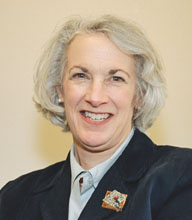
Sarah A.P. Cowan,
National Bank of Middlebury
Sarah A. P. Cowan
Senior Vice President, Loan Department Manager
National Bank of Middlebury
VW: Have you seen the positions of women change at your bank, and in the industry as a whole, over the years?
SC: In the 14 years I’ve been with the National Bank of Middlebury I haven’t seen a change, and personally, I have not felt any pressures that were unwarranted because I am a woman. The bank has always had a good number of women in management and supervisory positions. Our senior management team is made up of three women and three men and we have three women on the board of directors. We are a small institution in number of employees, but as a percentage, women in positions of responsibility and power are well represented.
When I look at the banking field in general, I must say that yes, I have seen a change—for the better. There are more women moving into positions where they weren’t found a few years ago—commercial lending for instance, which was traditionally a male bastion.
VW: What are your responsibilities?
SC: I joined as a residential loan officer, but quickly transitioned into the commercial lending arena. Since I have a degree in psychology from Colby College in Maine, I felt I needed to gain a greater understanding of the world of banking so, for three years, starting in 1997, I attended graduate school in banking for a few weeks each year. Around that time the bank experienced some staff changeover, which provided me with an opportunity to begin working my way into the position I have held since 2001.
As senior vice president, loan department manager, I am responsible for the entire loan function for the bank. My department ranges between 15 and 18 people. Six or seven are lenders, including two full-service branch managers whose primary function is lending. Although I don’t directly supervise them, they are members of the lending team. This department has grown and changed over the past two years and, I am proud to say, our loan balances have grown significantly, which has provided tremendous growth to the organization.
VW: Why banking and why Vermont?
SC: I moved to Vermont when Tim and I got married, as he was from the Northeast Kingdom. I spent the first few years here navigating between there and the Stowe area and then we moved to the Champlain Valley when I started working at Vermont Federal Bank, where my primary function was mortgage lending. We now have two teenagers, Seth and Helen.
VW: What was it like raising children & working your way up in a banking career?
SC: Funny you should ask, we were just talking about that in the office. It was very stressful. There was always the feeling like you were never doing 100 percent of what you should be doing. Someone said this morning that it was having to make a choice as to who you were going to disappoint the most. I don’t look at it quite that way, but I do experience dissatisfaction because I know I’m not being able to be the best at whatever I’m doing because of commitments I have from other aspects of my life. It’s always a tug of war.
VW: What are your biggest challenges?
SC: Being stretched in a number of different directions. Never feeling like I’ve gotten everything done. It probably has to do with working for a small organization and wearing a number of hats. However, it also provides the opportunity of being involved in a number of different areas that I wouldn’t be able to if I were in a larger bank.
VW: What is the most rewarding aspect of your career?
SC: Seeing the direct effects of what I do, in so far as how it affects the overall outcomes of our performance as a bank. That’s directly related to the fact that the bank is small so it means that I can have a greater impact. I find that extremely rewarding.
Another part of my job I love is the rapport I have with my staff—the time I spend working one-on-one with many of our lenders, whether it is supporting them, answering questions or helping them work through loan scenarios.
Finally, being involved with the community is wonderful. Bankers are often viewed as folks who make good members of local non-profit boards or organizations. It allows me to do things that are directly related to my career, but where I can also feel good at being involved in the community.
VW: Have you had a mentor in your career?
SC: Early on there were a couple of people whom I looked up to and I was able to grow because of my relationships with them. One was a man, one was a woman. Since then, it’s been more work relationships with people, although I do find trade organizations are very helpful to me. The Vermont Bankers Association enables me to meet with other folks who are in the same field. The other is Risk Management Association. Both provide opportunities to network with other bankers and I’ve established relationships that have enabled me to turn to someone and get help. Having the ability to go outside of my own organization has been very important.
VW: What advice do you have for young women coming into the field?
SC: Banking is a relatively friendly industry for women. It’s a nice place to work, it’s not physically demanding and benefits tend to be very good, so it’s not just the paycheck but other compensation, as well. The other thing that has played a vital role in my career is the educational opportunities. They are tremendous. Whatever career path you are interested in following, there is a professional course or seminar you can take and profit from in the long run.
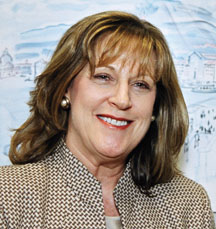
Linda J. Magoon,
Citizens Bank
Linda J. Magoon
Vice President, Retail Manager
Citizens Bank
VW: You are relatively new to Vermont and Citizens Bank. What brought you here?
LM: In 2003 we were living in Duesseldorf, Germany. Our son had started college in the U.S., we had a daughter about to go to college in the U.S., and we wanted to be closer to them, so we moved back to the States. We decided to come to Burlington because it had all the qualities we were looking for – college town, four seasons, and close to the mountains and a lake. I was extremely fortunate in that, soon after our arrival, I was offered a position with Charter One Bank as Regional Retail Manager – which I accepted. One year later, Citizens Bank purchased Charter One and we recently completed the conversion and integration of our Vermont branches into the Citizens’ system.
VW: How long were you in Germany and what did you do there?
LM: We lived in Germany for eight years. I had been working at Citibank in both Arizona and Colorado in various capacities for ten years when I was made aware of a new Citibank venture in Germany. During college I caught the international “bug,” switched my major from math to French; and took courses in German, Italian and Spanish. After college, I was awarded a Rotary Fellowship and studied a year in Italy, after which I studied German for a year in Heidelberg. After spending five years at a bank in Chicago as manager of their Special Events department, I attended graduate school in Arizona where I received my MBA in International Management. It should be no surprise, therefore, that my goal was to have the opportunity to live and work in Europe at some point in my career. After discussing the position with my husband, we decided it would be a terrific experience for the entire family and in March, 1995, we packed up our four children and moved to Nordhorn, a small town near the Dutch border where Citibank was opening its new operations/call center.
VW: That must have been quite an adjustment for everyone!
LM: Actually, it was remarkable how quickly everyone made the transition to a new language and culture. Since I already knew the language and had spent some time in Germany, I was comfortable from the beginning. The children and my husband were the amazing ones! At that time our son was 12 and our daughters 10, 8, and 5. The children all started immediately in German schools upon our arrival and, in no time, had made friends and were using basic phrases in the new language. The adjustment was more difficult for my husband. He didn’t speak any German when we arrived and had to establish the household while I was at the office and the children were in school. He had always worked prior to this move, so it was also a major change to go from a professional environment to being a stay-at-home spouse. Happily, I can say he made the transition quite well and actually enjoyed it. After three years with Citibank’s Credit Card Operations in Nordhorn, we moved to Duesseldorf, where another woman and I became the first female Retail Area Directors in the 68-year history of Citibank Germany. I was responsible for 27 retail banking branches in the Duisburg region. I held that job for three years and then left Citibank to work for QVC Deutschland for two years as Director of Customer Focus, where I was responsible for two call centers and Service Quality.
VW: What are your current responsibilities for Citizens Bank?
LM: I am responsible for all 26 Citizens branches throughout the state of Vermont, with a total of about 150 employees. One of my most important functions is motivating, mentoring, and encouraging our employees to achieve their best. One of my core business beliefs is that “customer relations mirror employee relations.” If our employees are treated well; if they’re excited about our products and services; and if they are challenged and rewarded in their environment, that develops satisfied employees and is reflected in how they treat our customers. This, in turn, results in satisfied customers.
VW: Having been a successful female executive for 25 years, what changes have you seen in the business environment regarding opportunities for women?
LM: Certainly the opportunities for women now are better than ever before, not only in middle and upper management, but in top management as well. That is certainly true here in Vermont, where you have executives such as Mary Powell at Green Mountain Power and Dr. Melinda Estes at Fletcher Allen, who serve as excellent examples and role models for young women. That having been said, I had hoped that by the time my daughters entered the workforce, there wouldn’t be any glass ceiling when it comes to advancement. Unfortunately, that is not the case yet, but I’m hopeful it will become so during the span of their careers.
VW: Would you recommend banking in general, and Citizens in particular, as offering good opportunities for women?
LM: Absolutely! Banking offers a wide range of opportunities and career paths. In addition to the traditional retail and commercial financial activities, within banking there are opportunities in marketing, community development and H.R., to name just a few. At Citizens Bank Vermont, 50 percent of our senior management team members is women and more than half of our 26 branch managers are women. The president of Citizens Bank in New Hampshire is a woman – Cathleen Schmidt. I would certainly encourage any interested women to explore a career in banking.
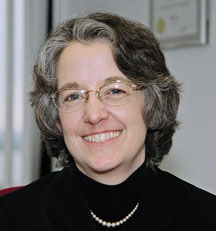
Louise Sandberg,
Chittenden Bank
Louise Sandberg
Senior Vice President and Director of Community Banking
Chittenden Bank, Burlington
VW: Is banking fun?
LS: Banking has always been fun for me. Being able to make a difference in people’s lives is my motivation. That’s why I’ve loved being on the lending side, because lenders help people fulfill their dreams, and that is definitely fun.
What’s also neat is being in a field where you can see people develop over the long term. I’m still working with some of the same customers I met and helped over 20 years ago.
VW: Speaking of 20 years ago, are women who are coming into the banking field now, different from they were at that time?
LS: Absolutely. Today, women are more confident than I certainly was, when I began working at a bank 33 years ago. They come in better prepared and more sure of their abilities, which is a great thing.
I worked at Chittenden Bank as a teller during the summers in order to help pay for college. While I majored in psychology and education, and took no business classes, immediately after graduating I spent four years at Vermont National Bank. I guess those psychology courses paid off, because banking is all about dealing with people, and I love doing that.
VW: Did your career path move upward easily?
LS: Nothing is easy, but I certainly was given the opportunity at every point to move into areas that interested me. When I rejoined Chittenden Bank 29 years ago as a customer service representative, I was able to quickly move into consumer lending, mortgage lending and then I managed the Middlebury office and worked in commercial lending, as well. After that I spent eight years managing a group of commercial lenders who focused on the small business market. I have been in my current post as manager of community banking since 2003.
As senior vice president and director of community banking, my job now is much more involved in strategic direction and planning. This involves planning where we need to be and how we are going to get there, and then working with the appropriate teams to get us there. In this position, my team consists of Chittenden’s 51 branches, the residential mortgage lenders, a team of financial advisors and the business bankers. This responsibility adds up to 400 employees, over $1.9 billion in deposits, $800 million in loans and $250 million in brokerage assets.
VW: Do women still have to come up through the ranks, as you did?
LS: No, but I recently read that the average experience in the business banking team is 22 years with Chittenden Bank, so a lot of our people do come up through the ranks – men and women. I think it speaks well of Chittenden that we have so many long term employees, but that means there isn’t opportunity for outside people at higher levels.
VW: Do women employees play a significant role in the bank?
LS: Chittenden has traditionally employed many women. In fact, in the 1970’s, the first woman senior vice president in banking in Vermont was from Chittenden Bank. Thirty-seven of Chittenden’s 51 market managers are women, and they serve in some capacity as officers of the bank. As far as the six senior managers who report directly to me, three are women. And, when I look at our business banking group – commercial lenders who have historically been male – the majority are now women.
Currently, there is only one woman on Chittenden’s board of directors; there was a time when Barbara Snelling was board chair [...].
While there may only be one woman on the board of directors, three of the bank’s senior management team of six are women, including me, and they attend every board meeting and report directly to John Kelly, the president.
VW: Was raising your family as you rose through the ranks difficult?
LS: Well, I have two sons, Tyler and Brad, now age 26 and 21, and a Cambodian foster son, Phun, so I had a lot of juggling to do, as do most women who work. Fortunately Chittenden Bank was pretty understanding and flexible about time, and I had children who were pretty understanding and flexible, so between the two we seemed to make it work.
The hours were long but I made my family a priority when the boys were younger. I tried to leave work so we could have a normal dinner hour and spend the evening together. After they were in bed I’d work for a couple of hours at home. My career grew as the boys grew so I was able to work the longer hours that were needed as I moved up because they were more independent.
In recent years the bank has made a huge effort to enable women employees to keep a balance in their lives. For instance, a couple of commercial lenders work 80 percent of time so they have one day a week to be with their kids or volunteer for schools. I think the bank is doing a good job of recognizing ability and talent and is working hard to keep a woman as she experiences life changes.
VW: What would you tell someone thinking of banking as a career?
LS: It is a great opportunity to build relationships and helping the people of Vermont, then there is no better career.
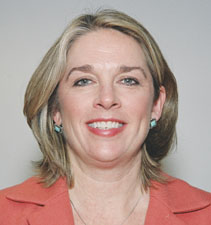 Janet P. Spitler,
Merchants Bank
Janet P. Spitler
Chief Financial Officer
Merchants Bank
VW: Have you encountered any stumbling blocks to your career because you are a woman?
JS: I’ve found it has been relatively easy to move ahead, both in banking and in my former profession of accounting. I think I’ve been lucky to work for corporate employers that are open-minded and don’t place barriers in front of women and their opportunities for advancement.
VW: Your former profession?
JS: I had no banking experience when I started at Merchants Bank. I was a CPA and had been with a public accounting firm in Boston and then with the Boston Financial Group until my husband Paul and I decided to move here during the summer of 1990.
Paul had gone to UVM and had spent summers at his family’s home across the lake in Westport, New York. He wanted to return, so we decided this was the place we wanted to raise our family. [The family now includes two children, Jacqueline, age 12 and Paul, age 14.]
VW: How did you get the job at Merchants Bank if you had no banking experience?
JS: I started as Assistant Controller. Even though I didn’t know the business, I had a strong accounting background from my experience as a CPA. My boss, Ed Haase, was a wonderful man who certainly was a mentor to me for the five or six years we worked together. He taught me a lot and gave me time to learn the industry of banking as I went along.
Ed left in 1995 and Merchants Bank President Joe Boutin put me in charge of the Finance function, and ultimately promoted me to CFO eight years ago, which certainly was an expression of his faith in my abilities.
Merchants Bank has a very family-oriented atmosphere; supportive of both males and females. I think that’s one of the reasons why I’ve stayed here for so long. It’s amazing to me that I’ve worked for one company for 15 years. I truly think it’s because the company doesn’t want its people to be slaving away for 60 hours a week, every week. That’s not what life is about. If I had to work those kinds of hours all the time—which is not to say that I don’t from time to time—I wouldn’t be able to fulfill what I see as my obligations to my family, as well as do my job at the bank to the best of my ability.
VW: What is your responsibility as CFO?
JS: The finance department is responsible for all the internal and external financial reporting for the bank. We do a lot of reporting to the board, and as we are a publicly-traded institution, there are a host of reporting requirements that go along with that—reports we have to do for the FDIC, the SEC and other regulators. My department is only nine people so it’s a busy one.
VW: Do women who work at Merchants Bank escape the stereotypical female roles found at other banks?
JS: Yes and no. Eighty-four percent of Merchants’ 314 employees are women. That’s certainly a record of which to be proud. There are two women on the board of directors, and two of our six senior managers are women. Thirty of our 35 branch presidents are women. I recently hired a Controller who is a woman, although that’s not why I hired her. I don’t look at gender when I’m reading a resume, I only look at qualifications.
We certainly do have a lot of the traditional gender type roles at the bank. Our human resources department, for example, is comprised of all women. Of the 143 people who work in the branches, traditionally skewed toward females, only 11 are male. Among our ten commercial lenders, traditionally skewed to males, two are women. In these ways we do follow along traditional lines, but there is no [deliberate] attempt to make it that way.
As a woman I look at this and ask myself why these things continue to perpetuate themselves? Anecdotally, I think some of it is happening because there appear to be more women who are choosing to stop working for a few years and stay home with their children. When they come back into the job market they may take a lower level or entry-level position. I don’t have any statistics to back this up, and it may not be a national trend, just something I’ve observed here in Vermont, but I do think it is real. It’s seems to be different from when I was in school and the expectation was that you would get to the top of your career and do it with a baby on each hip.
VW: Do better opportunities exist for women in banking?
JS: Many excellent opportunities exist in the banking field for women. They just have to determine what career path they want to take and how they want to move along it. At Merchants Bank, one of the issues that may be slowing upward movement is the large number of long term employees, some of whom are in senior level positions As these people retire or move onto other opportunities there are many talented women who are in place and ready to move up.
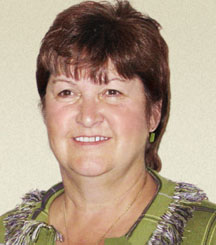 Jane Thayer,
TD Banknorth
Jane Thayer
Regional Vice President
TD Banknorth
VW: Do you find banking to be fun?
JT: Yes, I really enjoy the diversity [of it]; meeting the needs of our customers and the community is fun. It makes it easy to come to work every day – even 31 years later!
VW: Why and how did you get into banking?
JT: My parents owned a pharmacy on the same block as their bank, and I was responsible for making the business deposits daily. [From that experience] I decided that banking was what I wanted to do. However, I had to apply five times! On the fifth time, my dad suggested that I was not aggressive enough so he gave me a few words of wisdom. He told me to tell them that I would be loyal, dedicated, and that they would be making a mistake if they didn’t hire me. I was young; I went to the bank that day thinking “well, if they don’t hire me this time I will start applying at other banks in town.” I told the manager exactly what my Dad said to say… the manager did smile about the “making a mistake” part. It worked – the next day he called and the rest is history.
VW: How did you get to your current position? What is your particular area of responsibility?
JT: In my current position I’m in charge of the Northern Region, which consists of 20 branches in Franklin, Chittenden, Washington, and Orleans counties. I attained this position through a lot of hard work – and dedication.
VW: Did your career path move upward easily, or have you encountered any stumbling blocks to your career because you are a woman?
JT: I have found it has been an easily upward path… it hasn’t been my experience that my gender posed stumbling blocks.
VW: Do you have a family? If so, was raising your family as you rose through the ranks difficult?
JT: Yes, I have two grown daughters. The bank was very flexible when it came to my family needs. For example, I was able to leave early for Girl Scout meetings, or sporting events, or other school-related events. They always knew, however, that I would give 150 percent when I was there to ensure that the job got done.
VW: What is the most rewarding aspect of your career?
JT: I enjoy seeing folks who work for me grow and advance in their careers.
VW: What advice do you have for young women coming into the field?
JT: There is nothing really difficult in banking that you can’t learn; so I always tell young women, “you must have a great attitude, do more than you are being asked to do, be willing to accept change, dress for the job you want not the job you have and, above all – have fun.”
VW: Do women who work at your bank escape the stereotypical female roles found at other banks?
JT: Yes – Absolutely! There is no glass ceiling at our bank, women hold some of the highest positions.
VW: Have you seen the positions of women change at your bank, and in the industry as a whole, over the years?
JT: Yes: 30 years ago you didn’t see women hold the position of CEO – but now they do.
VW: It is said that women, while they are increasingly moving into top management positions, aren’t paid as much as their male counterparts. Is this true?
JT: This is true, however I would put a slightly different twist on it. I believe that women in banking normally do not look to move from bank to bank to improve their earning power like men often do. Therefore, their salary will only be adjusted on an annual basis and may not keep up with the men in the field that are willing to move from bank to bank for [dollars].
VW: From what you have observed, are women who are coming into the banking field now, different from they were, say, twenty years ago?
JT: Yes, more women are looking for a career and do expect to be treated and compensated for the job they are doing.
VW: What would you tell someone thinking of banking as a career?
JT: This is a great time to get into banking, lots of exciting things are happening in this day of technology. If you like people, enjoy a challenge, and are willing to work hard the world of banking is for you.
VW: Is there still a glass ceiling?
JT: The glass is not as thick as it was and a few have broken through at the very highest levels.
VW: Do you recommend the banking field to women?
JT: Absolutely. Apparently, I did unknowingly recommend it to one of my daughters – who now works for a competitor! It’s a cute story… She had graduated from college and started the job search. I went on vacation and when I returned she announced that she had a job. When I asked where, she said “At your competition.” She had never mentioned that she was interested in banking and when I asked her why, she said, “I watched you over the years. You never complained about your job, and always seemed so happy… I wanted a job like that.” She is still there after six years and doing very well.
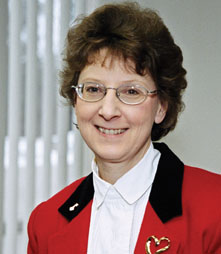 Laura Warren,
Key Bank
Laura Warren
Vice President, District Operations Leader
Key Bank, Burlington
VW: Why did you become a banker?
LW: My cousin worked for the FDIC as a bank examiner and I thought it sounded like a glamorous life — traveling from bank to bank, all across the state. So, after I graduated from college I started my career with the FDIC. I was the only woman on that crew, but it was a very good training ground because we traveled to virtually every bank in Vermont. I was forced to interact with bank management at very high levels, most of whom, at that time, were men. It enabled me to see, firsthand, how banks operated. In addition, the FDIC had a very extensive training program and, because it was a government agency and was very particular about non-discrimination, it was very progressive for women. I won’t say being the only woman didn’t have its challenges, but it was a very good training ground.
VW: How did you get to your current position at Vice President, District Operations Leader?
LW: When I decided to leave the FDIC – because I really got tired of all the traveling – I already had a sense at which banks I would like to work. Part of my criteria, frankly, were banks that were progressive and had management teams which were, I felt, willing and able to mentor a woman. When I joined what is now Key Bank, it had just changed to Bank of Vermont from Burlington Savings Bank. While at the FDIC I had seen and liked the way they treated their employees and particularly their female employees.
My first position was as special assistant to the office of the president. Over the years I have been lucky to have had very supportive bosses and mentors, most of whom were men. It has been my experience, although other women may state it differently, that back then the few women who were in positions of power in banking were less willing to assist other women than some of the men.
VW: If women make up close to half of banking employees, but only 15 percent of corporate officers nationwide, do you really see advancement for women in the upper levels of the field?
LW: When I came to Bank of Vermont in 1984 there were no women on the board of directors. Now, as Key Bank, half of our Vermont external Advisory Board [three of six members] are women. At that same time there was only one woman on the senior management team and now half are women.
Currently, we have 13 branches in Vermont and six are led by women. When it comes to the rank and file [tellers and other branch employees], the ratio of women to men is probably about the same as it always has been because from the manager level down women have always been well represented.
Because banking is such a people-driven business, Key Bank has had to change in order to stay competitive because the demographics of our clients have changed. In the old days, a woman let her husband handle all the financial transactions and if the poor guy died, the woman was helpless. Today, married women who are extremely savvy, maintain their own financials and are often in charge of the family finances. More importantly, as increasingly larger numbers of women have started their own businesses, opportunities for women in the banking field have exploded. This has been very exciting to see.
As I think back over the last 20 years, women’s advances, opportunities and success in financial services has mirrored those of women generally for any profession.
VW: What is your particular area of responsibility and how long have you been at it?
LW: Key Bank Corp. is nearly a $90 billion company in 15 states with a little over 1,000 branches, but my world consists of 13 branches in Vermont from Brattleboro to St. Albans, and 13 branches across the lake in New York from Plattsburgh to Watertown — about 150 employees all told.
I’ve worked with the branches for the past eight years, sharing the responsibility with my sales partner who worries about the sales production of the Vermont offices. I worry about the operations end: compliance, facilities, policies and procedure, staffing, recruiting and training, customer service, fraud and loss prevention. I am also responsible for the profit and loss of the branches, which is, in banking, the bottom line, and that is on what my performance reviews and pay raises are based.
VW: I’ve been told that women, while they are increasingly moving into top management positions, aren’t paid as much as their male counterparts. Is this true?
LW: I don’t know. I personally feel as though I am fairly compensated, but I don’t see a lot of industry statistics and it isn’t information that’s widely available at my level within my organization. There are salary ranges but that doesn’t mean two people doing the same job will be paid exactly the same thing.
VW: Is there anything particularly commendable about Key Bank when it comes to women?
LW: Since our acquisition by Key in 1995, I find the organization is totally committed to supporting women in business and matching our female employee expertise with women-owned businesses. Nationally, Key estimates it has more than 88,000 women-owned businesses as clients. When you go to the Web site, www.key.com/women you find an entire web site filled with resources for women. We also have a partnership with the American Heart Association to promote awareness of that serious health threat to women. There is definitely an attitude throughout the company that supports women, whether they are employees or clients.
Liz Schick is co-president of Women Business Owners Network (WBON), helping women manage their own businesses. She can be reached at liz@lsmktcomm.com.
|
